While colleges with aviation programs tend to offer pilot training, they can also offer programs that train students in airline mechanics and maintenance, aerospace engineering, and airline management.

Editorial Listing ShortCode:
Whether your sights are set on landing a job in the skies or on the ground, getting a bachelor’s in aviation can be a strategic way to build your knowledge, confidence, and skills in the world of aviation.
Colleges with Aviation Programs
Many aviation programs have faculty and learning resources that target specific kinds of aviation-related jobs and careers. Some bachelors programs offer a broad range of courses and topics, while others emphasize more specific job skills, such as aircraft maintenance or aviation management.
Select the program that most interests you to jump to that section of the guide:
Regardless of the specialty you select, you will still receive a strong foundation in aviation and related courses.
Bachelors in Aviation
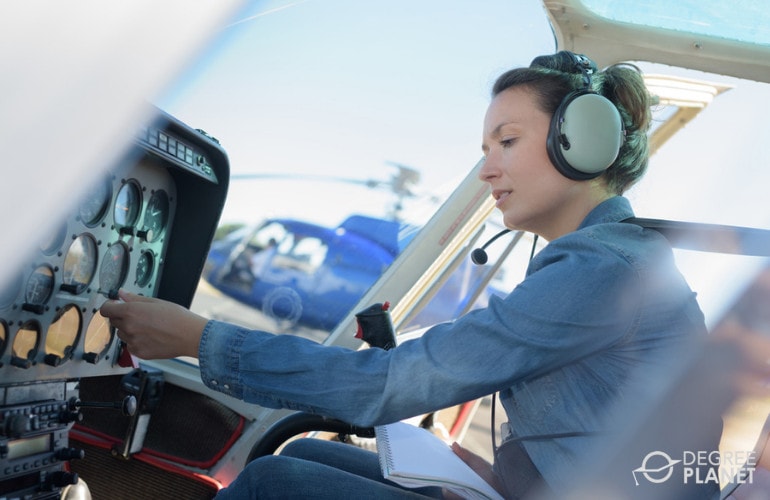
Bachelors in aviation programs can provide you with foundational knowledge in a range of aviation-related curriculum areas.
Those looking for pilot degrees may also end up with a bachelors in aviation. This kind of program can include flight training and a commercial or airline pilot track. An aviation major can also be a stepping stone to careers in aircraft and aircraft-systems engineering or aviation operations management.
Editorial Listing ShortCode:
A degree in aviation can be beneficial if you’re interested in acquiring broad aviation-sector knowledge. Some professionals may want to take a narrower approach and look for programs that emphasize aircraft mechanics and maintenance or aviation-related management skills.
Bachelors in Aviation Maintenance
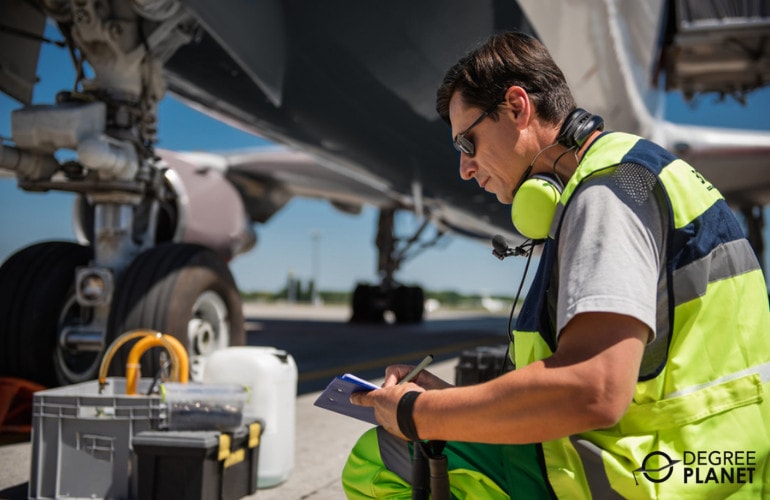
Safety is paramount in the aviation industry. Ensuring safety requires knowledge of advanced mechanical systems, of regulatory guidelines and requirements, and of proven aircraft testing and maintenance methods and technologies.
Aviation maintenance specialists learn specialized testing and maintenance methods and principles related to a range of aircraft components. They can become familiar with the aircraft’s frame, its propulsion systems, a range of discrete mechanical systems, and numerous electronic components, sensors, and systems.
Editorial Listing ShortCode:
Programs in aviation maintenance will include more than just vocational technician training. They can also provide more advanced engineering and technology training, with insights into maintenance logistics, safety regulations, aircraft insurance, and operational management.
Bachelors in Aviation Management

A bachelors in aviation management degree is designed to prepare you for a range of business and operational management roles in the aviation industry.
Within this kind of specialized program, there are additional areas of concentration related to the aviation industry that you can consider. These can include business administration, sales, insurance, manufacturing, airport operations management, and more.
Editorial Listing ShortCode:
You might want to consider an aviation program with a management focus if you have an aptitude for business administration. This degree can also be beneficial if you have an interest in management or operations analyst careers and want to focus on a complex industry.
Bachelors in Aeronautics
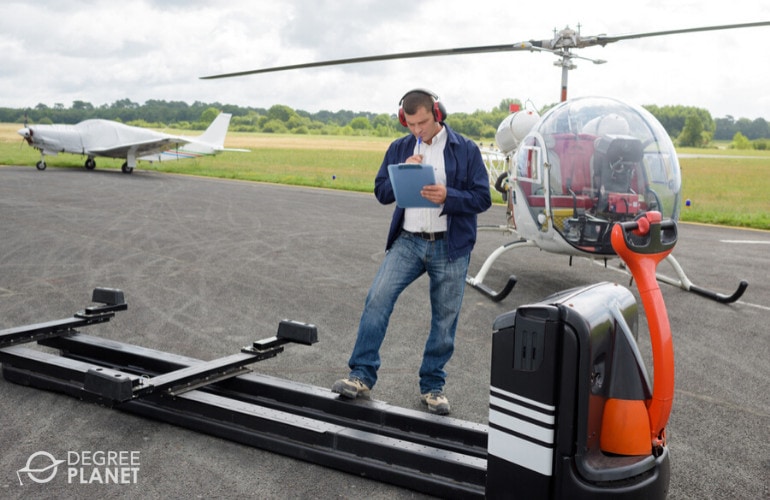
An aeronautics bachelors degree involves studying the science and mechanics of flight. Professionals with aeronautics expertise may want to develop technical knowledge related to the design, development, and manufacture of aircraft and aircraft systems.
Aeronautics curriculum designs can vary by school and program, but they’ll typically have more of an engineering emphasis than aviation degree programs. Aeronautics covers a broad range of topics reflecting the complexities of designing and building modern-day aircraft.
Editorial Listing ShortCode:
Concentrations in this field can relate to the design and development of complex aircraft systems, such as propulsion vs. navigation. Other concentrations can include mechanical engineering and flight physics as well as topics related to structural designs, electrical sensors and systems, instrumentation, materials, and even meteorology.
Students interested in careers in aircraft maintenance, flight engineering, and aircraft design may consider attending a college of aeronautics.
Aviation Careers & Salaries
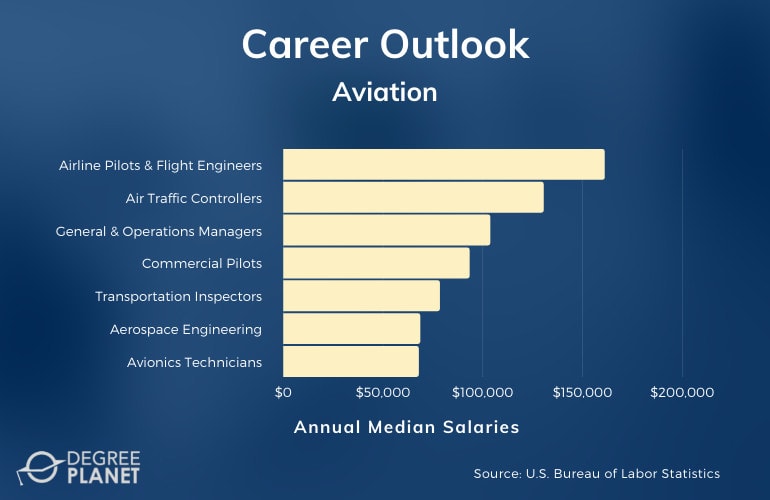
Career paths in aviation range from pilot to engineer, and they can also include business administration roles and air traffic control specializations.
According to the Bureau of Labor Statistics, here’s an assortment of careers in the aviation industry.
| Careers | Annual Median Salaries |
| Airline Pilots, Copilots, and Flight Engineers | $160,970 |
| Air Traffic Controllers | $130,420 |
| General and Operations Managers | $103,650 |
| Commercial Pilots | $93,300 |
| Transportation Inspectors | $78,400 |
| Aerospace Engineering and Operations Technicians | $68,570 |
| Avionics Technicians | $67,840 |
| Aircraft Mechanics and Service Technicians | $66,440 |
| Flight Attendants | $59,050 |
| Transportation Security Screeners | $44,300 |
Both the salaries and qualifications for different kinds of careers in this sector can vary widely. The aviation industry involves a wide range of career pathways, so it’s helpful to look for colleges and programs that offer course designs aligned with your particular career interests.
Getting a bachelor’s degree in general aviation or an aviation specialty could help you attain a broad base of relevant knowledge. You might find vocational programs that help you get certified for entry-level airline maintenance technician jobs. Other college programs can help you earn the appropriate certifications to qualify as an airline pilot.
Aviation Curriculum & Courses
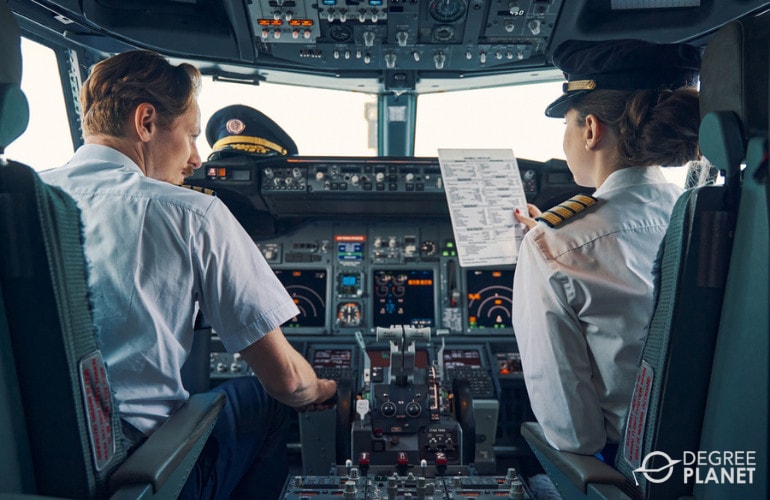
This list highlights a range of topics that can be covered in aviation and aeronautics degree programs, but the courses you take will depend on the program you choose.
- Introduction to Aviation Concepts: You’ll learn about standard aviation methods, practices, and concepts used in the airline industry and outlined by the Federal Aviation Administration.
- Aircraft Systems: This course provides an overview of all primary and secondary aircraft mechanical, propulsion, electronic, navigational, and safety systems. It will familiarize you with cockpit instrumentation.
- Aviation Safety: You’ll learn about safety-related systems and procedures and learn more about safety-related instrumentation and technologies on modern aircraft.
- Airline and Commercial Aviation Operations Management: This course gives you a business administration perspective on the planning and coordination of operational logistics in the aviation industry.
- Aviation Maintenance Technology and Standards: This course gives an overview of aircraft maintenance standards, methods, and procedures along with an introduction to a range of mechanical and information-based aviation maintenance technologies.
- Aeronautic Engineering and Aircraft Design: This course provides instruction in a range of foundational aeronautic engineering concepts and principles, with an overview of modern aircraft design features and innovations.
- Flight Navigation Principles, Systems, and Technologies: This course covers the basic principles and methods used in flight navigation, and it gives an overview of modern navigation systems and technologies.
- Airport Design and Logistics: This course is designed to introduce students to modern airport planning and design principles. It also ensures that aspiring pilots, aviation managers, and flight controllers understand key features of airport design, logistics, technology, and security.
- Air Traffic Controls and Automated Flight Systems: Guided by FAA approved methods and practices, this course provides an introduction to air traffic control systems and procedures, including topics related to manual and automated flight systems.
- Aviation Dynamics and Materials: This course is a systematic introduction to critical physical laws and principles governing aviation design, dynamics, and safety, including the properties and dynamics of materials and critical aircraft systems.
The courses you focus on will likely depend on your area of concentration. What you learn from a broad aviation curriculum may help you build more confidence and success in this sector, regardless of your final career path.
How to Choose an Aviation School
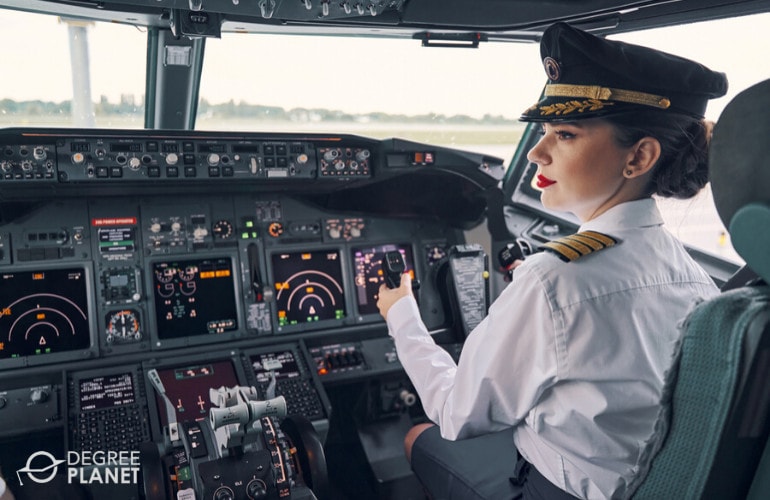
Picking the right aviation school and flight training program can require some careful consideration and should be guided by your individual learning needs and career goals. Here are some factors to consider:
- Interests and career goals. It’s helpful to know if you’re looking for a well-rounded aviation program or for something more specialized. If you want flight training, it’s strategic to find a program that incorporates a pilot license track.
- Educational setting and training resources. A well-designed degree program that’s taught online may be a strategic choice for some students. If you want a chance to learn about flying or aviation mechanics, technologies, and systems in a hands-on environment, you may want to look for programs that offer more than virtual instruction.
- Good industry reputation. You can ask various schools about the relevant career success of their graduates. You can also ask about the school’s instructional resources and look for information that helps you assess the school’s reputation and standing in the industry.
- Flight training components. It’s beneficial to receive realistic information about what levels of pilot training are included in a program. It can also help to compare any additional flight training fees in different programs.
If you’re still unsure about which aviation path is best for your individual goals and circumstances, you may want to compare different program offerings to see which ones best align with your interests.
Aviation Colleges Admissions Requirements

Admissions requirements can vary between schools, but for most online and on-campus aviation programs, common requirements include:
- SAT or ACT scores (only some schools require them)
- High school diploma or equivalent
- Satisfactory GPA
Applying to bachelors in aviation degree programs and aviation universities is often the same process as applying to other bachelor’s programs. Qualifying for flight training may have unique requirements based on FAA regulations, such as passing a medical exam.
Accreditation

When selecting a college to get a bachelor’s degree, it’s beneficial to choose from fully accredited aviation universities.
Regional accreditation helps ensure that the degree you earn is more likely to be honored by other schools, licensing boards, and even prospective employers. Regional accreditation provides the highest level of assurance that you’ll be getting access to rigorous instruction that meets relevant academic and industry standards.
Editorial Listing ShortCode:
Accreditation can also be a precondition for some forms of financial aid. The Council for Higher Education Accreditation (CHEA) provides information about accreditation and about finding accredited schools.
Aviation Accreditation Board International (AABI)
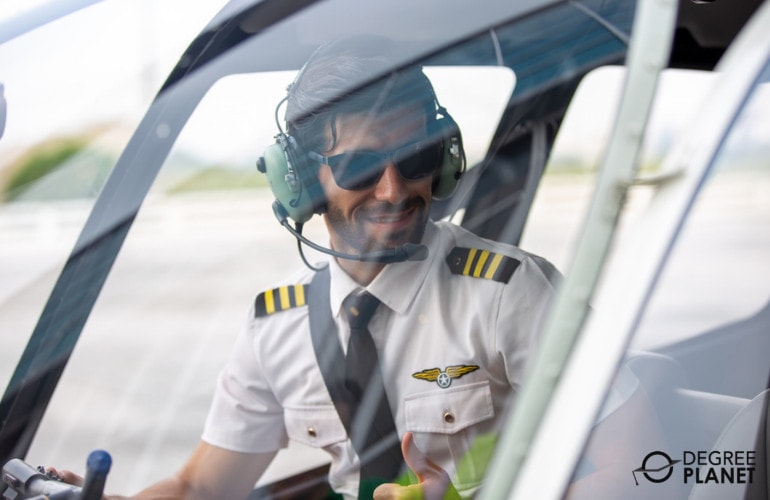
In addition to regional accreditation standards that apply to schools, specialized degree programs may also be eligible for programmatic accreditation.
Programmatic accreditation is awarded to programs whose curriculum and training meet standards set by industry professionals. For aviation programs, programmatic accreditation is conferred by the Aviation Accreditation Board International (AABI).
If you plan to obtain aviation-related certifications or licensing, you may find that some institutions, employers, and licensing authorities require programmatic accreditation.
Licensure and Certifications in Aviation
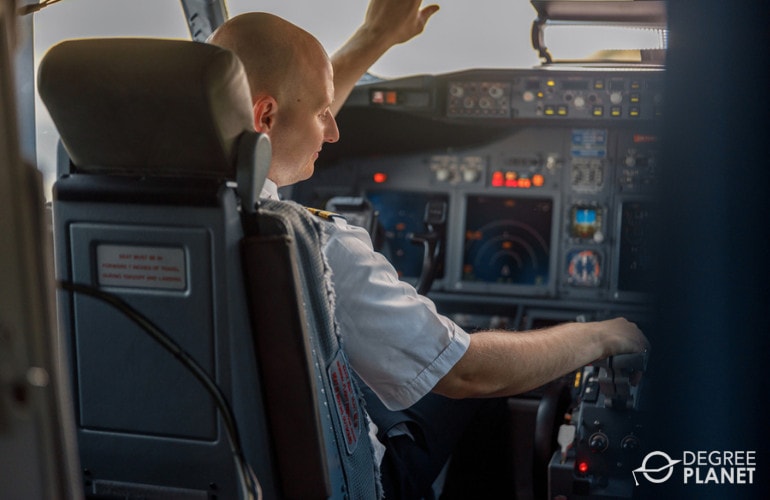
There are many levels of pilot certification. Pilot certifications, or licenses, each have different qualifying requirements and provide different levels of flying restrictions and privileges.
Each level of certification requires additional hours of flying time and can have increasing levels of medical certifications and minimum age requirements. If you’re planning to use your pilot license for recreational purposes and personal use only, you can earn a recreational pilot or private pilot certification.
These lower-level certifications come with restrictions, limiting the type of aircraft you can fly, your hours of operation, and your approved flying conditions.
A commercial pilot certificate and airline transport pilot (ATP) certificate are higher-level certifications. They allow you more flying privileges, including the ability to receive payment for flying services.
An ATP certification is the highest level for a pilot and is required to work for airlines. To be a professional pilot, there are strict certification requirements. It’s strategic to learn about any relevant licensing standards before researching aviation degree programs.
Financial Aid and Scholarships for Aviation Major Students

The cost of aviation programs, and especially flight training, can add up. Many qualifying students rely on financial aid to move forward.
Financial aid can include state or federal education grants, scholarships, employer-based assistance, and student loans. Terms of financial aid offers can vary, so it’s beneficial to review all offers carefully.
If you’re expecting to apply for need-based financial aid, a helpful first step can be submitting the Free Application for Federal Student Aid (FAFSA).
What Is an Aviation Degree?
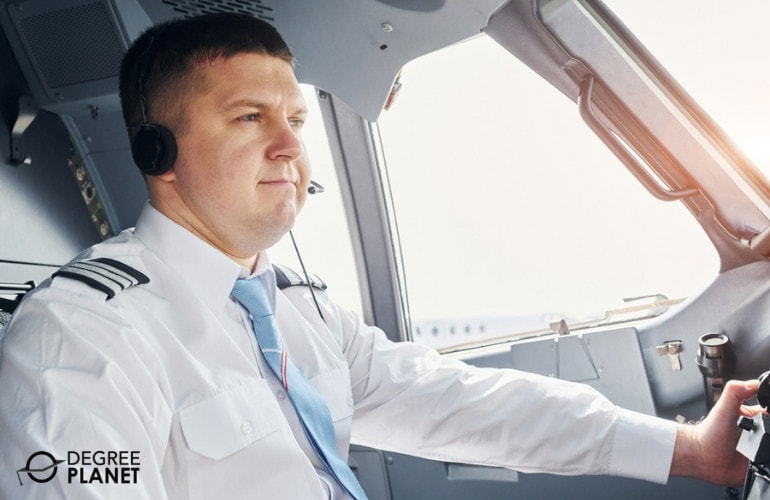
An aviation degree is a degree that prepares students to work as pilots or in other aviation-related roles.
Many students pursue aviation degrees to learn how to become a pilot. Aviation programs can also help open doors to careers in aircraft maintenance and engineering as well as air traffic control.
Editorial Listing ShortCode:
Aviation degree programs vary by school, but they typically cover a range of topics related to aircraft systems and operation, aircraft engineering and design, air traffic control, and meteorology. They can also cover aircraft safety and navigation as well as laws and regulations related to the avionics industry.
What Can You Do with an Aviation Degree?
What you can do with an aviation degree will depend on your concentration and interests in the field. Aviation training can help you qualify to earn pilot certifications, or it can allow professionals to pursue roles in aviation-related operational management and administration.
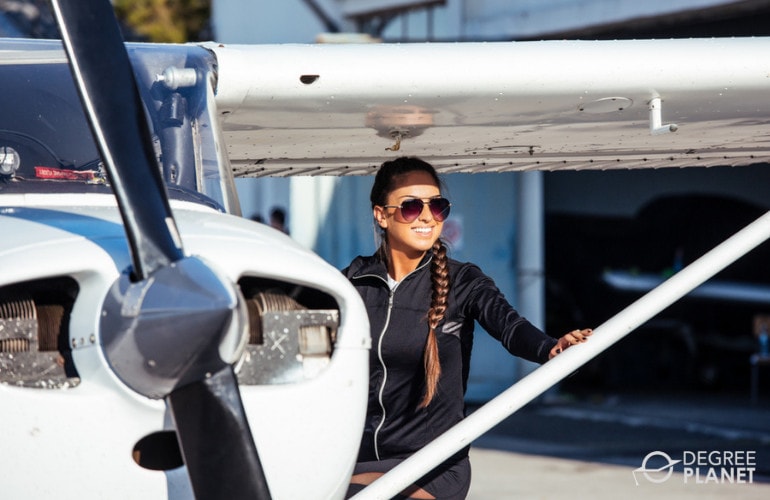
According to the Bureau of Labor Statistics, the aviation sector offers diverse career paths, but each can be fairly specialized. Careers in this field include airline and commercial pilots, air traffic controllers, aviation facilities and operations managers, flight attendants, and aircraft and avionics equipment mechanics and technicians.
How Much Do Pilots Make?
How much pilots make can vary based on their type of certification, industry, employer, geographical location, and experience, among other factors.
According to Bureau of Labor Statistics, the median salary for airline pilots, copilots, and flight engineers is $160,970. Commercial pilots make a median salary of $93,300. Employment for airline and commercial pilots is projected to grow 5% over the next ten years (Bureau of Labor Statistics).
How Long Is Aviation School?
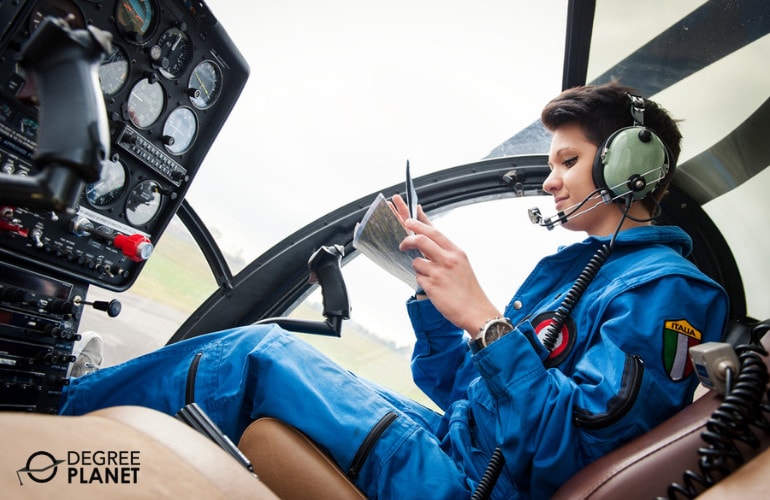
Getting a bachelor’s degree in aviation or a related specialty generally takes 4 years with traditional, full-time study.
Some programs may offer accelerated study options if you want to finish in less time. For example, online programs often follow an 8 week semester calendar. It may be possible to complete your degree sooner if you follow this schedule with continuous, year-round enrollment.
If you’re planning to earn a pilot certification, the time it will take to complete the flight training is likely to vary by school and program. The hours of supervised flight instruction and training can also vary based on your pilot certification goals.
Is an Aviation Degree Worth It?
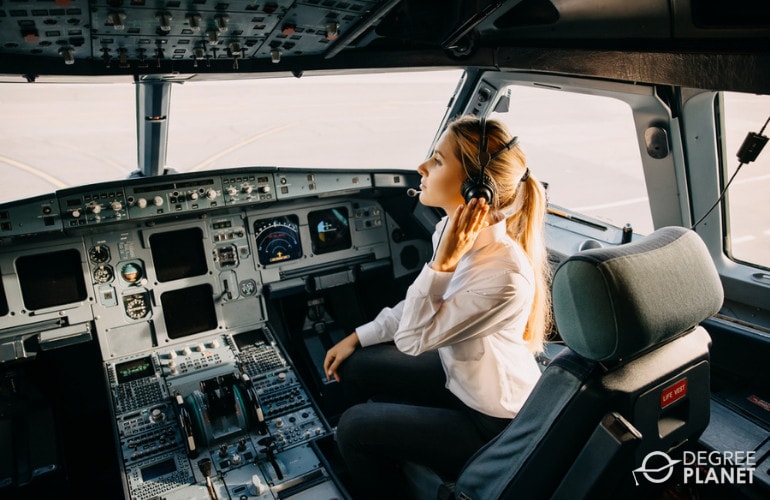
Yes, an aviation degree is worth it for many students. The aviation sector is a massive industry filled with challenging and exciting job opportunities.
The airline industry and commercial pilot sector both have ongoing demand for highly reliable and qualified pilots. Employment for airline and commercial pilots is forecast for 5% job growth over the next ten years (Bureau of Labor Statics).
Editorial Listing ShortCode:
Being a pilot isn’t the only exciting job in the aviation industry either. Both commercial aviation companies and airports need skilled facilities, management, and operations specialists with combined aviation and business administration skills.
The aviation industry also has demand for skilled aeronautics engineers, flight engineering specialists, and maintenance technicians.
Universities Offering Bachelors in Aviation Degree Programs
Methodology: The following school list is in alphabetical order. To be included, a college or university must be regionally accredited and offer degree programs campus, online, or in a hybrid format.

Baptist College of Florida offers a B.A. in Missions with a concentration in Aviation. The curriculum includes coursework on missions and FAA-approved flight training. Programs at BCF are designed to provide general education, a Biblical theological foundation, and practical skills to help students with their future careers.
The Baptist College of Florida is accredited by the Southern Association of Colleges and Schools Commission on Colleges.

Central Washington University offers a Professional Pilot B.S. with specializations in Flight Officer (FO) and Commercial Pilot (CP).
Students have the opportunity to earn Private and Commercial Pilot licenses, as well as an Instrument Rating. Students in the FO program can also earn a Multi-Engine Rating and a Certified Flight Instructor Certificate.
Central Washington University is accredited by the Northwest Commission on Colleges and Universities.
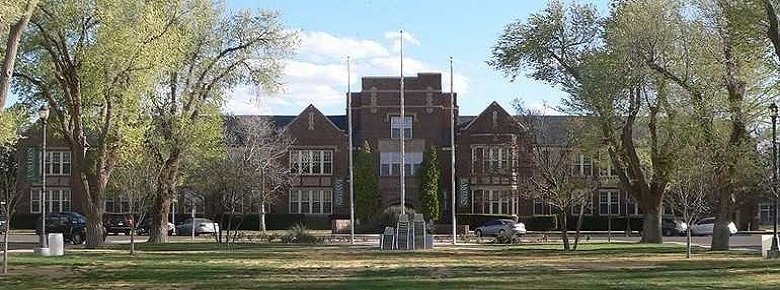
Eastern New Mexico University offers a Bachelor of Science in Aviation Science and a Bachelor of Applied Arts and Science in Aviation Science. Either track can help prepare you for a number of aviation-related careers. Coursework is available online to accommodate non-traditional students.
Eastern New Mexico University is accredited by the Higher Learning Commission.
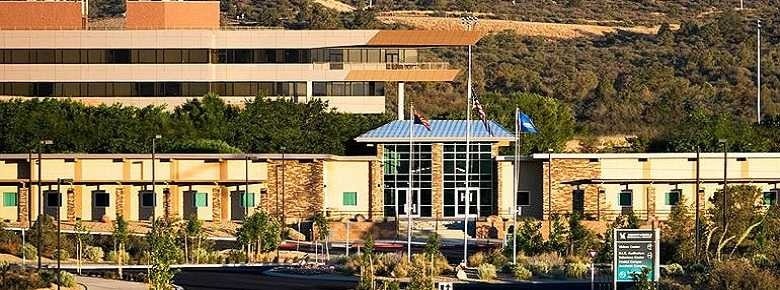
Embry-Riddle Aeronautical University offers a Bachelor of Science in Aeronautics program at all three of its campuses. Coursework is also available online. Embry-Riddle is accredited by both the Aviation Accreditation Board International (AABI) and the Southern Association of Colleges and Schools Commission on Colleges (SACSCOC).
Embry-Riddle Aeronautical University is accredited by the Southern Association of Colleges and Schools Commission on Colleges.

The Florida Institute of Technology offers a B.S. in Aeronautical Science with Flight or Non-Flight emphases. Students who choose the flight option have the opportunity to fly within their first week of study. Students typically graduate with 250-300 hours of flight experience. This program is approved by the FAA and accredited by the AABI.
Florida Institute of Technology is accredited by the Southern Association of Colleges and Schools Commission on Colleges.

Hampton University is an HBCU (Historically Black Colleges and Universities) institution with a B.S. in Flight Education program that is approved by the FAA.
Flight training is completed in late model Cessna aircraft, and students have the opportunity to earn a Commercial Pilot Certificate and a variety of ratings. There is also a flight simulator lab on campus.
Hampton University is accredited by the Southern Association of Colleges and Schools Commission on Colleges.

Kansas State University offers a Professional Pilot B.S. program that includes hands-on learning from day one. It is FAA approved and gives students opportunities to complete commercial pilot training and qualify for a Restricted Airline Transport Certificate. There is a towered airport conveniently located next to the campus.
Kansas State University is accredited by the Higher Learning Commission of the North Central Association of Colleges and Schools.

LeTourneau University’s B.S. in Aviation Studies program is highly customizable, with options to choose coursework related to specific branches of the aviation industry. Options include Aviation Management, Aviation Safety Factors, Financial Analysis for Managers, and Business Ethics. Coursework is available both on campus and online.
LeTourneau University is accredited by the Southern Association of Colleges and Schools Commission on Colleges.

The B.S. in Aeronautics program from Liberty University provides students with FAA Part 141 Flight Instruction.
Courses include Commercial Flight, Airline Operations, and Advanced Jet Systems. Students who already have a pilot’s license may receive college credit. Liberty University is committed to helping students develop leadership skills and strong Christian character.
Liberty University is accredited by the Southern Association of Colleges and Schools Commission on Colleges.

Lynn University offers a Bachelor of Science in Aviation Operations. Students can use their electives to pursue flight training to become a professional pilot.
Coursework covers primary flight theory, aviation safety, weather, aviation history, air traffic basics, and aviation technologies. The program also provides studies in business analytics, management, and leadership.
Lynn University is accredited by the Southern Association of Colleges and Schools Commission on Colleges.
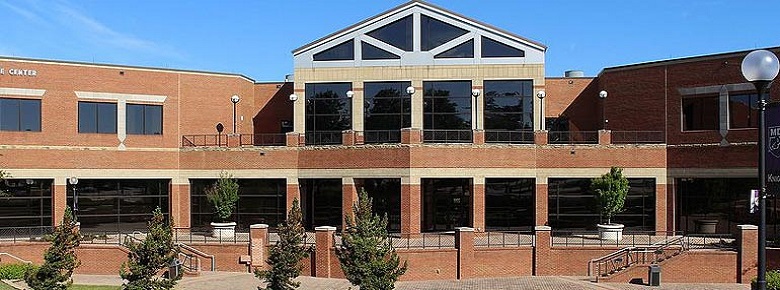
Middle Georgia State University offers a B.S. in Aviation Science and Management. Students can choose either the Flight track or the Management track. Students in the flight track can learn to fly either airplanes or helicopters. Coursework includes aviation safety, aviation meteorology, advanced aerodynamics, and advanced navigation.
Middle Georgia State University is accredited by the Southern Association of Colleges and Schools Commission on Colleges.
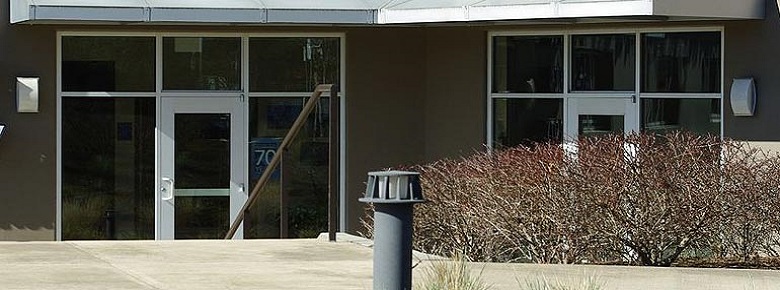
Professional pilot training is a prerequisite for entry into National American University’s Aviation Management degree program.
Coursework can be completed 100% online. This online aviation degree program is designed to be a good fit for current pilots, active military, and veterans. The program is 180 credit hours, including general education core courses, aviation management core courses, and open electives.
National American University is accredited by the Higher Learning Commission.

Polk State College offers a Bachelor of Science in Aerospace Sciences with a choice of two concentrations: Aerospace Administration or Professional Pilot.
Students in the B.S. program must already possess private and commercial pilot’s licenses and an instrument rating. These can be earned in Polk State’s associate degree program or through any FAA approved provider.
Polk State College is accredited by the Southern Association of Colleges and Schools Commission on Colleges.

Purdue University offers a Bachelor of Science in Professional Flight. Students can complete all of the academic coursework for the program online and all flight hours with an affiliated Part 141 instruction program in Jacksonville, Florida.
Online courses follow 10 week terms and are designed to provide the flexibility needed for students to study while also attending flight school.
Purdue University is accredited by The Higher Learning Commission of the North Central Association of Colleges and Schools.

Southern Illinois University has an AABI accredited program in Aviation Management and Flight. The program covers flight, aviation maintenance, avionics technology, air traffic control, aircraft operations support, safety, and airport management and planning. SIU is well-known for its highly successful competitive flight team, the Flying Salukis.
Southern Illinois University is accredited by the Higher Learning Commission.

Southern Utah University offers a Bachelor of Aviation Science that is recommended for helicopter and airplane students.
The program is approved for FAA restricted ATP, meaning students can take an ATP checkride after completing just 1,000 documented flight hours. Coursework includes studies in aviation safety, aviation meteorology, airport security, aviation law, and aviation economics.
Southern Utah University is accredited by the Northwest Commission on Colleges and Universities.

At Texas A&M University—Central Texas students can earn a 100% online degree in Aviation Science while also attending flight school. Qualifying certificates and ratings can be transferred in for credit toward the degree. The program requires 120 credit hours and includes coursework in science and technology, business administration, and management.
Texas A&M University-Central Texas is accredited by the Southern Association of Colleges and Schools Commission on Colleges.
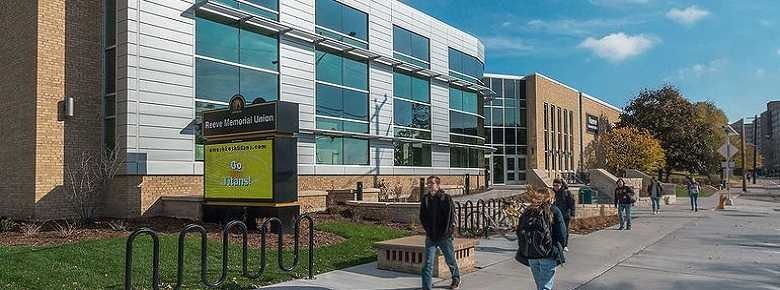
The University of Wisconsin—Oshkosh offers a Bachelor’s in Aviation Management that can be earned 100% online. Qualifying FAA certifications can count as credit towards the degree. Courses are offered in 7 week sessions and are intended to be flexible to meet the needs of working students.
The University of Wisconsin – Oshkosh is accredited by the Higher Learning Commission.
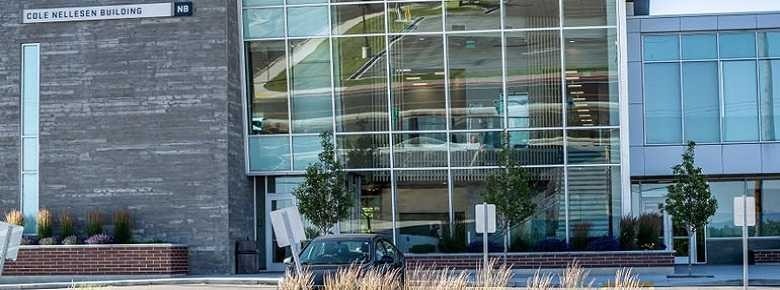
Students of Utah Valley University’s Professional Pilot degree program can take FAA Flight Training and graduate with a Commercial Pilot Certificate.
Students also have the option to earn additional certificates up through Multi-Engine Instructor. Coursework can be completed online, and students may complete flight training at the FAA approved flight school of their choice.
Utah Valley University is accredited by the Northwest Commission on Colleges and Universities.
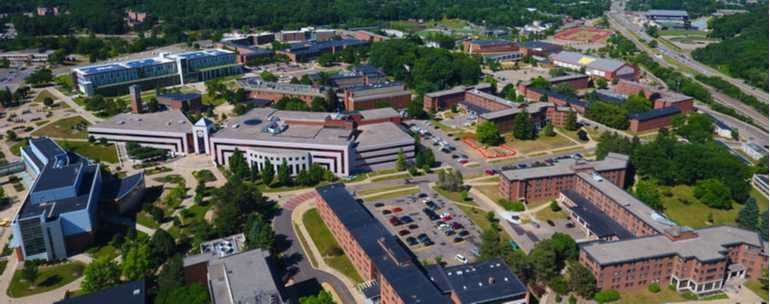
Western Michigan University’s College of Aviation is home to one of the largest fleets of Cirrus aircraft in the world. Students have opportunities to practice flying in and out of a variety of airports and learn the necessary skills to handle varying temperatures and weather conditions.
Western Michigan University is accredited by the Higher learning Commission.
Getting Your Bachelor’s Degree in Aviation Online

Whether you’re searching for a commercial pilot school or colleges with flight programs or aviation maintenance or management programs, there’s a wide variety of options to choose from.
There are even accredited schools that offer aviation programs online. If you’re pursuing an online pilot degree, you might complete your coursework online and complete your flight training at an approved flight school near you.
You might be surprised to discover just how many types of aviation programs are available to choose from. So, why not start exploring your options today? The sky’s the limit!

